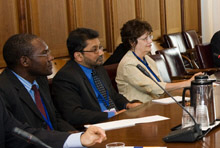
Typical street scene in Santa Ana, El Salvador. (Photo: iStock)
IMF Survey: Civil Society Meetings Mull IMF Governance, Post-Crisis Role
May 5, 2010
- Civil society shows strong interest in post-crisis global economy
- Greater voice for low-income countries in IMF, G-20 sought
- IMF relationship with civil society deepening
The 2010 Spring Meetings played host to civil society events that were marked by record-high attendance—as well as substantive and constructive policy exchanges on topics ranging from IMF governance to Africa’s response to the global financial crisis.

Civil society representatives meet with IMF Managing Director Dominique Strauss-Kahn during the recent Spring Meetings (photo: IMF)
IMF-WORLD BANK SPRING MEETINGS
About 575 representatives of civil society organizations (CSOs) were accredited to the meetings, where the focus of their involvement was the Civil Society Policy Forum, a three-day series of seminars. Most of the seminars were proposed and organized by CSOs, with IMF and World Bank staff participating. CSO representatives also met privately with IMF Managing Director Dominique Strauss-Kahn.
“The partnership of the IMF and World Bank with civil society is growing,” said Andrew Kumbatira, Executive Director of the Malawi Economic Justice Network. “There’s still a lot more to be done, but we’re on the right course. The leadership of both institutions is forthcoming, and that’s gratifying to us.”
Twice a year, in spring and in fall, the IMF and the World Bank bring together central bankers, ministers of finance and development, private sector executives, civil society representatives, and academics to discuss issues of global concern. This year’s Spring Meetings, held April 24 and 25 in Washington, D.C., involved some 2,000 delegates from 186 countries.
IMF’s mandate
Underlying many discussions at the CSO Policy Forum was the question of what the IMF’s mandate should be in a post-crisis world. In one session, panelists assessed the IMF’s performance vis-à-vis poor countries during the global economic crisis and discussed the institution’s role going forward. The debate on the Fund’s mandate is mainly focused on the advanced countries, CSOs said. Yet in low-income countries, the Fund’s role is arguably more important, as it is often a determining factor in whether a country is able to attract the billions of dollars needed to fight poverty.
Some CSOs acknowledged the IMF’s catalytic role in low-income countries during the crisis. Matthew Martin (Development Finance International) encouraged the institution to “do even better what it is already doing well” and make its lending policy framework more flexible and better adapted to countries’ circumstances. To increase the effectiveness of IMF support to poor countries, Martin suggested that the institution provide interest-free loans on a permanent basis, not just through 2011. His recommendation was part of an Oxfam report that he co-authored.
Samura Kamara (Sierra Leone’s Minister of Finance and Development) noted that low-income countries still face major challenges and will continue to need the IMF’s help in maintaining adequate fiscal space to address post-crisis problems. Kamara called for greater financing flexibility in IMF programs.
Greater voice for poor countries
CSOs highlighted IMF governance reform as another vital issue. In a session organized by the New Rules for Global Finance Coalition, panelists called for greater voice for low-income countries in the institution. The process of realigning IMF quota shares to give emerging market and developing countries more influence—as agreed at the G-20 Pittsburgh Summit in 2009—was moving too slowly, several stressed. Ranjit Teja (IMF) pointed out that the realignment process was highly political and would need time to play out.
CSOs also called for low-income country representation in the G-20 and in the Financial Stability Board, a group established to help improve the functioning of the financial markets and reduce systemic risk.
In other sessions, CSOs discussed the future of the dollar as a global reserve currency, the challenge of financing sustainable energy policies, and the possibility of instituting a tax on the financial sector to ensure that financial institutions bear the direct costs of any future crisis.
Fellowship program
The IMF provided fellowships to attend the Spring Meetings for the first time this year. Those fellowships went to 15 CSO representatives who would normally not have the opportunity to travel to Washington. Participants from Bangladesh, Bolivia, Egypt, Ghana, Haiti, Kenya, Latvia, Malawi, Mongolia, Mozambique, Peru, Sri Lanka, and Ukraine were selected from organizations worldwide. A few were unable to attend because of the Iceland volcano.
The fellowship initiative is intended to offer a broader group of civil society representatives an opportunity to interact with IMF staff and other CSO representatives. This interaction is a key benefit of the IMF-World Bank Spring Meetings, according to Habiba Tasneem Chowdhury, Chief Coordinator of the Institute of Hazrat Mohammad (SAW) in Bangladesh.
“If I talk only about Bangladesh, I don’t know what’s happening in Chad or Burundi,” Chowdhury said. “This is the platform to bring together all our experiences—what works and what doesn’t—and, at the same time, recognize the unique socioeconomic dynamics of each region.”


